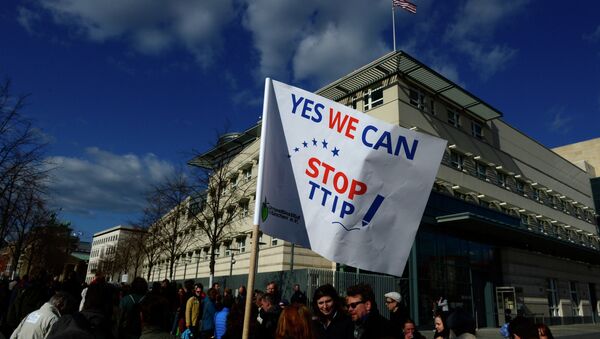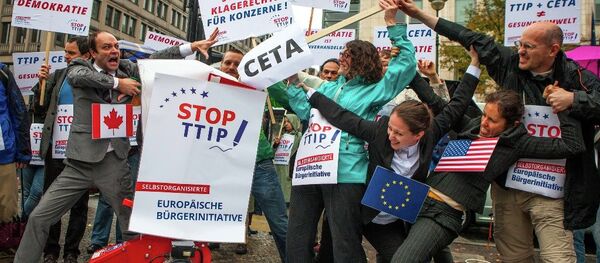The TTIP, currently under negotiation between the EU and the US, is a proposed free trade agreement between the two parties that could result in multilateral economic growth for both sides.
Proponents of the scheme says European firms will benefit from opening up the United States to EU firms, helping cut bureaucracy and making it easier and fairer to export, import and invest.
A study by the Centre for Economic Policy Research (CEPR) suggests that TTIP will create gains for the EU of $132 billion a year and$105 billion for the US.
Five reasons to support #TTIP — Growth, global standard setting, jobs, innovation and investments. @Alliance4TTIP pic.twitter.com/SGeLfTc7It
— Anders Edholm (@andersed) July 21, 2015
However, research conducted by Dr Gabriel Siles-Brügge from The University of Manchester, says many of the financial benefit claims are exaggerated. "An impartial reading of these key documents relating to the Transatlantic Trade and Investment Partnership (TTIP) shows quite clearly that these huge figures are vastly overblown and deeply flawed," said Dr Siles-Brügge.
"It's an overly optimistic view coloured by the political imperatives of the likes of the European Commission and certain member state governments."
Meanwhile a research paper for the Austrian Foundation for Development Research found that claims of the positive economic effects of TTIP "are overstated and neglect crucial adjustment costs and the social costs of regulatory change."
#TTIP is a chance to set global standards in industry & services. #SMEs would greatly benefit. Credit @Alliance4TTIP pic.twitter.com/smmtv1e3hP
— AmCham Germany (@AmChamGermany) July 21, 2015
Critics of the TTIP say the trade deal will remove regulatory barriers which restrict the potential profits to be made by transnational corporations on both sides of the Atlantic. The charity War on Want says these 'barriers' are in reality "some of our most prized social standards and environmental regulations, such as labour rights, food safety rules (including restrictions on Genetically Modified Organisms), regulations on the use of toxic chemicals and digital privacy laws."
Regulatory Flaws Exposed
One of the most controversial aspects of the TTIP is the controversial proposal for an investor-state dispute settlement (ISDS) mechanism, which would allow companies to sue governments if their regulations or laws affected their profits.
http://t.co/2aYfpPoP1o.@UKTradeMinister #TTIP the Dark Side. ISDS an attack on #democracy pic.twitter.com/PEonx7N8XO
— People's NHS (@PeoplesNHS) July 21, 2015
Thus, if a US multinational company lost profits because their product or service was banned by law for health or other reasons. Critics believe large multinational companies — which have been lobbying hard for the TTIP — will force through a trade agreement that would reduce the ability of democratically-elected politicians to regulate the market.
And it is the harmonization of the differing regulatory systems that has caused the greatest controversy.
In his latest blog, written with Nicolette Butler, Dr Siles-Brügge says: "The fear here, voiced by numerous NGOs and critical scholars, is that such procedures would result in 'regulatory chill'.
"By having to subject their proposals to such scrutiny — where the principal metric is the extent to which such measures unduly impinge on transatlantic trade rather than a broader social, environmental or public health objective — the ability of governments to regulate in the public interest would be constrained. Of course, the exact impact of such ‘non-decisions' is very difficult to gauge, but these moves are certainly intended to move regulators and legislators in the direction of doing ‘less' rather than ‘more'."






